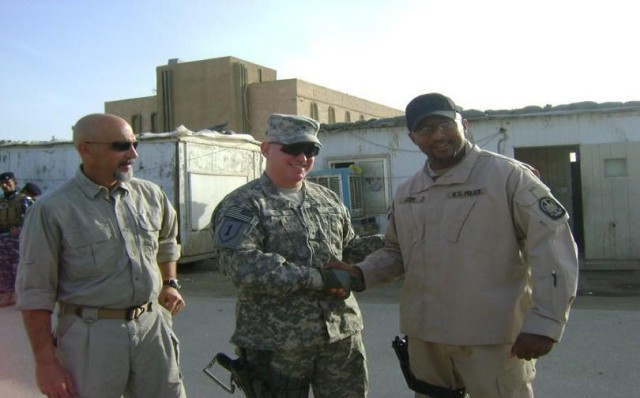
Assisting the Iraqis with professionalization of their police force is a challenging but very rewarding mission. The citizens of Iraq continue to bravely step-up and embrace the opportunity to secure their people and to set favorable conditions for IraqAca,!a,,cs laws to guide the populationAca,!a,,cs safety.
U.S. Soldiers are assisted by former and serving law enforcement officers assigned to Civilian Police Assistance Training Team or CPATTs Aca,!A"Cee-PatsAca,!A? as they assist the Iraqi Police. Together they help the IP develop of sophisticated crime fighting and law enforcement practices.
Since 2003, U.S. Forces and Iraq personnel have targeted their efforts to man, equip and train the Iraqi Police Force. In that model, International Police Advisors were assigned individual police stations and directed to conduct basic police skills training and low level problem solving to rank-n-file shurta.
Things are different now.
This old concept proved useful in providing basic skills to the lowest ranking IPs. But in 2010, the U.S. Soldier and CPATT advisors now focus on professionalizing the IP leaders so they can in-turn develop their own shurta.
International Police Advisors sare aligned into teams that operate at the numerous Iraqi Police Command locations across the country. While assigned to these teams, the IPAAca,!a,,cs have assisted the IP commanders and their staff in understanding best practices for law enforcement.
This phase of IP development places importance on the creation of Iraqi generated standards and procedures that are based on internationally accepted standards of democratic policing as outlined by the United Nations and the Organization for Security and Cooperation in Europe (OSCE).
In southern IraqAca,!a,,cs Dhi Qar province, Soldiers from 1st Battalion, 77th Armor Regiment and CPATT personnel were invited to live in downtown Nasiriyah at the Provincial Joint Coordination Center by the province police chief, Staff Maj. Gen. Sabah Al-Fatlawi.
The round-the-clock interaction has resulted in a strong relationship between the IP and their advisor. When the IP have a request for training, U.S. experts are always present.
Chukwuemeka Atum aka Aca,!A"Chuk,Aca,!A? a CPATT member, has been in law enforcement for over twenty years. His area of expertise is within organized crime divisions, tactical operations, Special Weapons and Tactics teams, protective services and counterterrorism.
Aca,!A"Since being in theatre over 15 months, I have witnessed a drastic improvement in the way the Iraqi Police think and function. Initially the Iraqi Police (IP) wanted to take the back seat on everything to include, training, logistics, operations, investigations & community policing,Aca,!A? said Atum. Aca,!A"At this stage, more IP are beginning to take the leadership role.Aca,!A?
Aca,!A"We are seeing more meetings within the IP and responsibilities are being taken on even by the lowest shurta. Most IP are enthused by training, they want to train and actually enjoy it most times. If itAca,!a,,cs something they enjoy, they simply ask to extend or continue the training past its end date,Aca,!A? said Atum.
Operating under the command of 1st Infantry Division, the Advise and Assist mission of the 4th Brigade, 1st Armored Division has reinforced the concept of embedded security force assistance operations.
Aca,!A"We donAca,!a,,ct commute, we embed,Aca,!A? is one of the principles instilled by the commander of the 4th Brigade, 1st Armored Division, Col. Peter Newell.
The constant cultural exchange benefits the IP and their U.S. advisors who live in the PJCC. Both the U.S. and Iraqi leadership communicate with their respective counterparts daily to ensure that a unity of effort is maintained for security in Dhi Qar.

Social Sharing